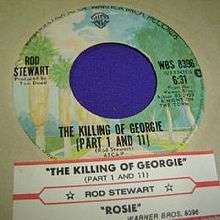The Killing of Georgie (Part I and II)
| "The Killing of Georgie Parts 1 and 2" | ||||
|---|---|---|---|---|
 | ||||
| Single by Rod Stewart | ||||
| from the album A Night on the Town | ||||
| B-side |
"Fool for You" (UK) "Rosie" (US) | |||
| Released | 1976 | |||
| Genre | Pop rock, soft rock | |||
| Length | 6:30 | |||
| Label |
Riva (UK) Warner Bros. (US) | |||
| Songwriter(s) | Rod Stewart | |||
| Producer(s) | Tom Dowd | |||
| Rod Stewart singles chronology | ||||
| ||||
"The Killing of Georgie (Part I and II)" is a song written and recorded by Rod Stewart and released as a track on his 1976 album A Night on the Town. The song tells the story of a gay man who was killed in New York City. A two-part song, Part I was the more popular hit and was blended into the more melancholy and sombre Part II.
The song was released as a single in August 1976 and spent ten weeks on the UK Singles Chart, reaching a peak position of No. 2.[1] It charted moderately well elsewhere, reaching #25 in the Netherlands, #30 in the U.S. and #33 in Canada.
Lyrics
The song's lyrics tell the tale of a friend of the narrator, a gay man, the eponymous Georgie. The song follows Georgie through his life.[2] When Georgie reveals his sexuality to his parents his father asks, "How can my son not be straight, after all I've said and done for him?" Georgie, cast out by his parents, heads for New York City where he becomes successful and popular in Manhattan's upper class, "the toast of the Great White Way". The narrator visits him in Summer 1975, when Georgie tells him he's in love; the narrator is pleased for him. Georgie attends the opening night of a Broadway musical, but has no interest in lingering afterward so he leaves "before the final curtain call" and heads crosstown. He is attacked near East 53rd Street by a New Jersey gang of thieves that was waiting in a car on a "darkened side street" and one thief inadvertently kills him. The narrator remembers Georgie's advice on living life to the full while young, before it ends. The song ends with the narrator begging Georgie to stay.
The year of Georgie's death is given as 1975 purely for the purposes of the song's rhyme. The murder of the individual on which the song is based occurred in 1974.[3]
Background
In the May 1995 issue of Mojo, Stewart explained: "That was a true story about a gay friend of The Faces. He was especially close to me and Mac. But he was knifed or shot, I can't remember which. That was a song I wrote totally on me own over the chord of open E." The switchblade knife in the song's lyrics implies that Georgie was stabbed to death.
When he was asked about writing a song with a gay theme, Stewart said, "It's probably because I was surrounded by gay people at that stage. I had a gay PR man, a gay manager. Everyone around me was gay. I don't know whether that prompted me into it or not. I think it was a brave step, but it wasn't a risk. You can't write a song like that unless you've experienced it. But it was a subject that no one had approached before. And I think it still stands up today."
Part I covers terrain similar to "Walk on the Wild Side" by Lou Reed and also uses sampling of melody and backing vocals.[4]
Part II provides a coda to the song and employs a melody identical to The Beatles' "Don't Let Me Down". In a 1980 interview, John Lennon said, "the lawyers never noticed".[5]
Charts
References
- ↑ "Rod Stewart". Officialcharts.com. 2016. Retrieved 6 April 2016.
- ↑ Rod_Stewart: The Killing of Georgie
- ↑ "Rod Stewart - The Killing Of Georgie". Bestsongsever.com. Retrieved 6 April 2016.
- ↑ "Steve and Abe's Record Reviews". Angelfire.com. Retrieved 2016-10-08.
- ↑ English, Timothy (Oct 12, 2007). Sounds Like Teen Spirit. iUniverse. p. 107.
- ↑ Kent, David (1993). Australian Chart Book 1970–1992 (doc)
|format=requires|url=(help). Australian Chart Book, St Ives, N.S.W. ISBN 0-646-11917-6. - ↑ "Item Display - RPM - Library and Archives Canada". Collectionscanada.gc.ca. Missing or empty
|url=(help);|access-date=requires|url=(help) - ↑ "Rod Stewart". Officialcharts.com. 2016. Retrieved 6 April 2016.
- ↑ Joel Whitburn's Top Pop Singles 1955-1990 - ISBN 0-89820-089-X
- ↑ "Top 50 Singles of 1976". Music Week. London, England: Spotlight Publications: 25. 25 December 1976.
- ↑ "Top 200 Singles of '77 – Volume 28, No. 11, December 31 1977". RPM. Library and Archives Canada. Retrieved December 28, 2017.
- ↑ Whitburn, Joel (1999). Pop Annual. Menomonee Falls, Wisconsin: Record Research Inc. ISBN 0-89820-142-X.